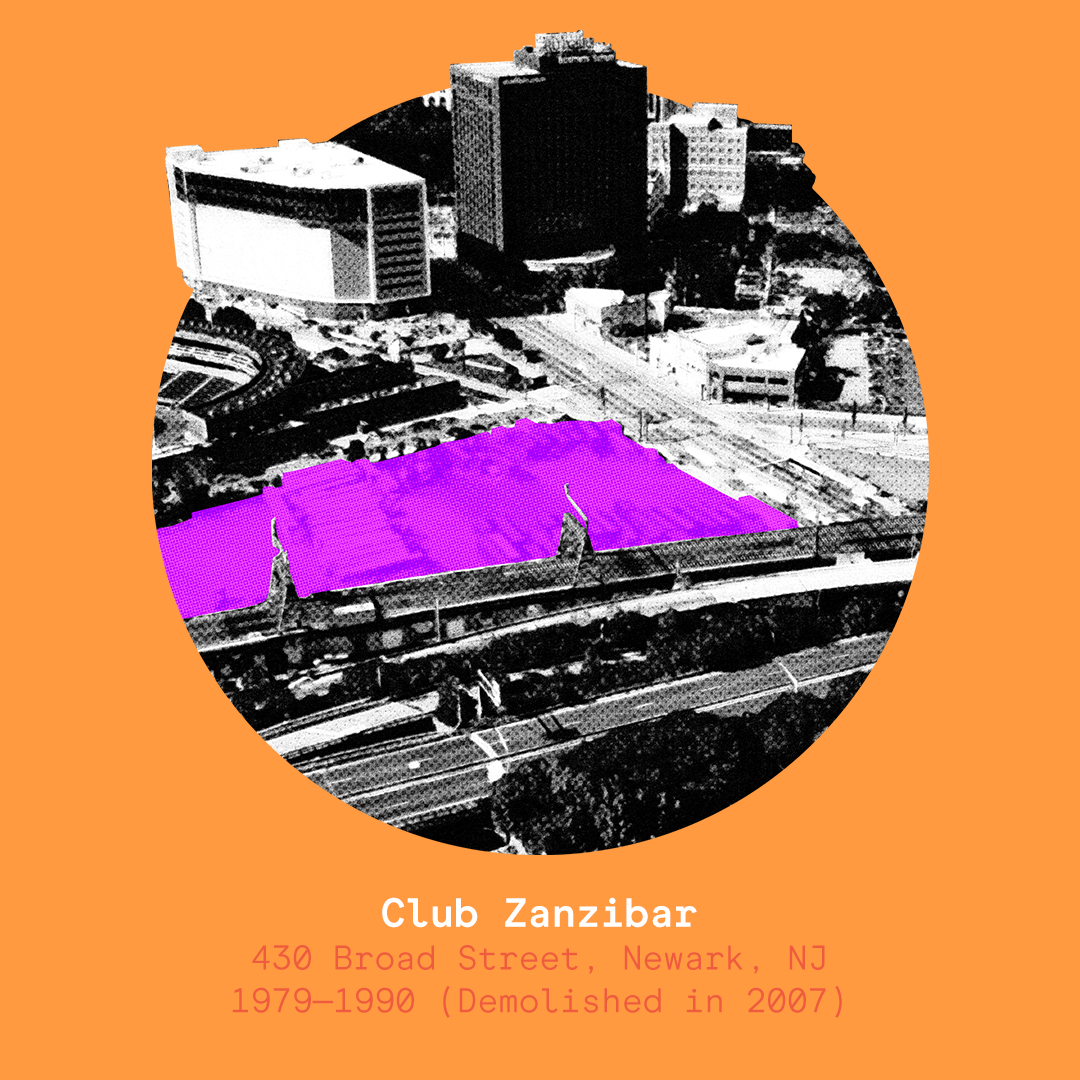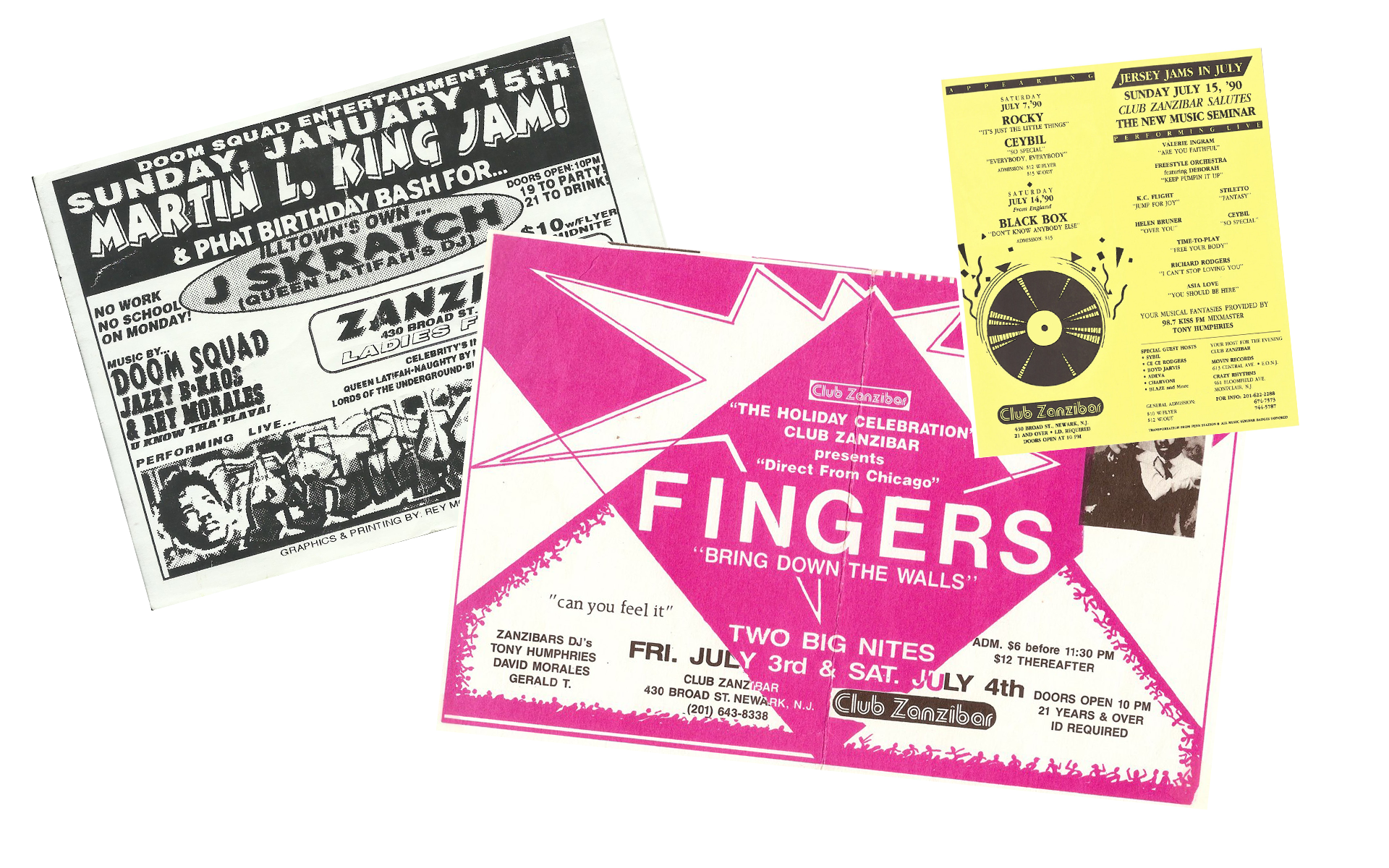By the late 1970s, New York had a number of nightclub destinations for queer folk.
There were the exclusive parties at Nicky Siano’s The Loft, the sped-up house tracks pulsating from Paradise Garage, and the celebrity-laden elusive gatherings at the famed Studio 54. However, drive a little past the Lincoln Tunnel towards the Garden State, and you’ll find the Lincoln Hotel in Newark, New Jersey. Hidden on the second floor was a ballroom where patrons could hear disco, R&B, and the burgeoning new sound known as “house.” You’ve just stepped into Club Zanzibar, Newark’s answer to the discotheques of New York City, where legendary DJs like Tony Humphries and Kerri Chandler got their starts.

Located on the corner of Broad Street was a red velvet and burgundy tapered motel, originally a Holiday Inn. Purchased and refurbished by owner Miles Berger, the developer had an interest in starting a new club but zero experience in night entertainment. Gerald T, asked to DJ at the new venue, suggested that they install a sound system by engineer Richard Long. To give Berger a sense of what direction the club should take, Long brought him to Paradise Garage. Berger fell in love with the venue and planned to replicate it for Jersey. Often called Paradise Garage’s little sister, much of the space was based off of it, using the exact same sound system, Thorens turntables, reel-to-reel machines, and more in a much smaller space. The club officially opened its doors on Labor Day weekend of 1979. Gerald T played The Sugarhill Gang’s “Rapper’s Delight,” handed to him by Joe Robinson of Sugar Hill Records that night, to an excited and receptive crowd.
Tony Humphries and the Jersey sound
Considered as one of the forefathers of house music alongside Larry Levan and Frankie Knuckles, Tony Humphries would eventually become a resident at Zanzibar in 1982. He got his start DJing for WRKS 98.7 Kiss-FM in New York, playing many records by label Philly International (home to Patti LaBelle, Harold Melvin & The Blue Notes, and Teddy Pendergrass, among many others). Like the club founders of Zanzibar, Humphries was also deeply inspired by Paradise Garage. “I’m not even going to try to play the Paradise Garage,” he recalled to Red Bull Music Academy in 2014. “I never got a chance to play that. I said, ‘This is going to be my Paradise Garage, right here,’ and that’s what I tried to do.”
DJing a few gigs here and there at Zanzibar, he eventually convinced the club owners to give him a regular slot on Wednesday nights. Initially, he took great inspiration from Larry Levan’s work at the Garage. “The way [Levan] handled a super club, I should call it, every week, it was just intriguing to me,” he said. “How can this man play so long? You come in there at one in the morning and he’s still playing the next day. That became sort of my thing. I wanted to be able to learn how to play for a long stretch of time.” He eventually forged his own techniques, taking cues from his days at Kiss FM. “The way you handle radio, I was doing it at Zanzibar,” he recalled. “I would make sure that I would play a familiar song within 15 – 20 minutes. I would play a male song 15-20 minutes, a female song. I would play a track. That was the way I kept them there for like seven, eight, nine hours. I wasn’t going to play all the hits in a row.”
The sound, rising out of Zanzibar by DJs like Humphries, was known as the “the Jersey Sound,” the Garden State’s take on what was being crafted in Chicago at the Warehouse and in New York at Paradise Garage. This take on house music focused more on soulful R&B vocals in comparison to the funk-disco blends of other locations. Hear it below in tracks like Adeva’s “Respect.”
Other performers included vocalist Barbara Tucker, who told Red Bull Music Academy in 2015, “I was blessed to perform my own ‘Beautiful People,’ ‘Deep Inside,’ and ‘I Get Lifted’ at Zanzibar. It was the kind of place where the music, house music, could generate a kind of love energy, so it was a wonderful place to be. The energy, the vibe, the music selection… it was all good.” DJ Jon Martin recalled the welcoming space as well. “The room would get gayer and gayer as the night went on,” he said. “I went to Zanzibar for the first time in 1988 for Paris Dupree’s Ball, Paris is Burning.”
Paris Dupree and voguing at Zanzibar
One of Club Zanzibar’s greatest legacies is as the location for Paris is Burning, Jennie Livingston’s 1990 documentary about ballroom culture. For those unfamiliar, ballroom (or ball) focuses on voguing, a type of dance inspired by modeling images from Vogue magazine. Voguing competitions gained popularity from the 1960s through the 1980s in “houses.” Houses were communities fostered for black and latino queer folk throughout the US, who were facing extraordinary amounts of violence, poverty, and the ongoing AIDS crisis. Famous houses included the House of Xtravaganza (one of the first Latino houses in Harlem), the House of Ninja, and the House of Dupree, where Paris Dupree not only created a community in New York, but also spearheaded voguing competitions, pitting house against house. Octavia St. Laurent, a subject of the Paris is Burning documentary, said to Dazed Digital in 2009 that “the concept of what a ball was… It was a victory to us. Something serious.”

Zanzibar closes
By the 1990s, Humphries was finding success in the UK, where his mixtapes had become popular. House, and subsequently garage, were exports exploding in popularity over in London. When he returned to Zanzibar, he experienced what had become a new club. “After I finally got back from that time in London, the club had changed a lot. It just wasn’t the same,” he recalled to Red Bull Music Academy. “They had finally decided to make it a very hip hop-friendly place.” New owners came in, changed the name to Brick City, and catered to the hip hop sound that was dominating the East Coast. “It was sad, but by then I had the international thing going pretty strong… so it could have been worse.”
Gerald T echoes the sentiment. “Once Zanzibar went hip hop, that was it. There was fighting, stabbings, all kinds of stuff. I was happy that I was out of there by then.” Kerri Chandler recalled a tragic story to Attack Magazine. “My girlfriend was murdered outside the club. [That] was typical,” he said. “My girlfriend Tracy at the time… her ex-boyfriend didn’t like the idea of us being together at all. This night Tracy was going to stop at Zanzibar first then meet me at Club America. He was at Zanzibar that night and saw her in the club, walked out with her I guess, raped her behind the club, bashed her head open with a rock, and left her dead. It was a few days before he confessed to what he did and what happened.”
Humphries recalls seeing the writing on the wall. “The numbers at Zanzibar were starting to go down,” he told Resident Advisor in 2017. “The gay crowd started having other places to go, women were not coming as much. [They] made it into a hip hop sort of place, so it wasn’t my thing anymore. There wasn’t anything I could do about it.”
Before eventually moving to London, Humphries played his final set at Zanzibar, closing out with Archie Bell & The Drells’ “Where Will You Go When the Party’s Over.” “It was my last song to a tearful audience at [Club Zanzibar],” Humphries explained. “It was around 5:30 am, after being given the permission to stay and play as long as I wanted to. The song is very dear to the Club Zanzibar core people. Known for being a Philly International fanatic, I thought this was fitting.”
Hear some of the tracks spun at Club Zanzibar in our Spotify playlist:







Leave A Comment
You must be logged in to post a comment.